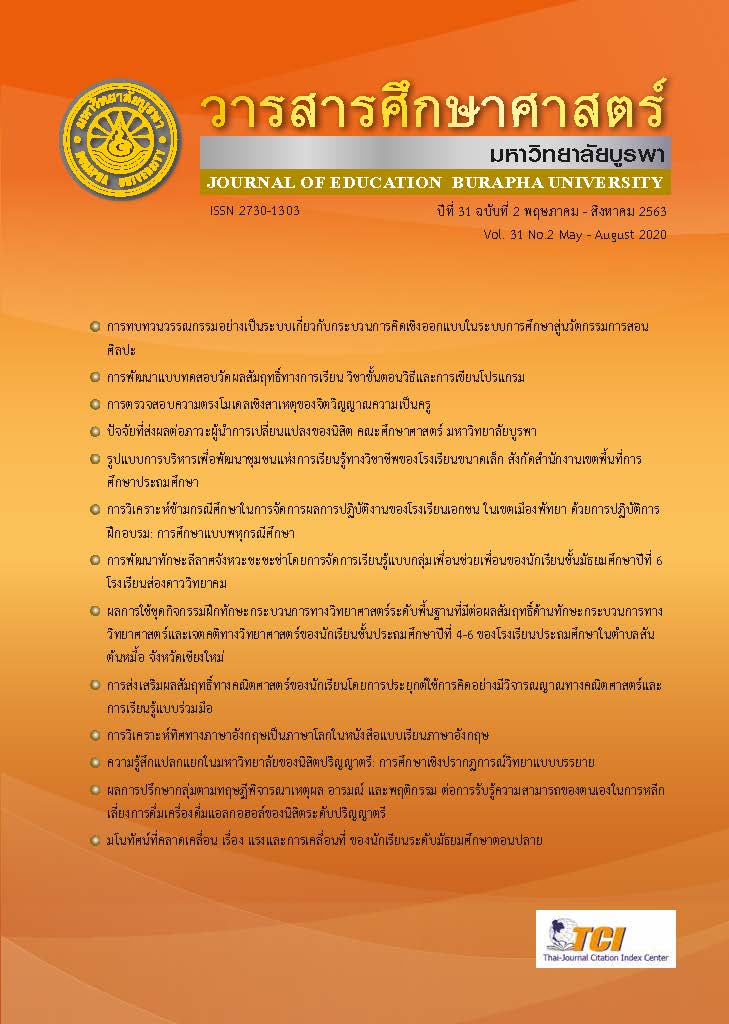มโนทัศน์ที่คลาดเคลื่อน เรื่อง แรงและการเคลื่อนที่ ของนักเรียนระดับมัธยมศึกษาตอนปลาย
คำสำคัญ:
มโนทัศน์ที่คลาดเคลื่อน, แรงและการเคลื่อนที่, นักเรียนระดับมัธยมศึกษาตอนปลายบทคัดย่อ
การวิจัยนี้มีวัตถุประสงค์เพื่อศึกษามโนทัศน์ที่คลาดเคลื่อน เรื่อง แรงและการเคลื่อนที่ ของนักเรียนระดับมัธยมศึกษาตอนปลาย กลุ่มตัวอย่างที่ใช้ในการวิจัย ได้แก่ นักเรียนระดับมัธยมศึกษาตอนปลาย ของโรงเรียนแห่งหนึ่งในจังหวัดชลบุรี ภาคเรียนที่ 1 ปีการศึกษา 2561 จำนวน 90 คน ซึ่งได้มาด้วยวิธีการสุ่มแบบกลุ่ม ระดับชั้นละ 1 ห้องเรียน เครื่องมือที่ใช้ในการวิจัยคือแบบวัด Force Concept Inventory (FCI) ซึ่งเป็นแบบวัดมาตรฐาน วิเคราะห์ข้อมูลโดยใช้ ค่าเฉลี่ย และร้อยละ
ผลการวิจัยพบว่า นักเรียนมีมโนทัศน์ เรื่อง แรงและการเคลื่อนที่ เฉลี่ยร้อยละ 30.81 โดยมีมโนทัศน์ที่คลาดเคลื่อนเกี่ยวกับแรงคู่กิริยา/ปฏิกิริยา มากที่สุด (ร้อยละ 24.58) รองลงมาคือการเรียงต่อกันของอิทธิพลอื่น ๆ (ร้อยละ 22.50) แรงขับดันภายใน (ร้อยละ 20.58) จลศาสตร์ (ร้อยละ 20.49) แรงกระทำ (ร้อยละ 16.90) และมีมโนทัศน์ที่คลาดเคลื่อนเกี่ยวกับอิทธิพลอื่น ๆ ต่อการเคลื่อนที่น้อยที่สุด (ร้อยละ 14.81)
เอกสารอ้างอิง
ขจรศักดิ์ บัวระพันธ์, เพ็ญจันทร์ ซิงห์, และวรรณทิพา รอดแรงค้า. (2548). การสำรวจแนวคิดของนักศึกษาครูวิชาเอกฟิสิกส์ชั้นปีที่ 3 เกี่ยวกับแรงและการเคลื่อนที่. วารสารสงขลานครินทร์ ฉบับสังคมศาสตร์และมนุษยศาสตร์. 11(พิเศษ), 45-69.
สถาบันทดสอบทางการศึกษาแห่งชาติ (องค์การมหาชน). (2559). สรุปผลการทดสอบทางการศึกษาระดับชาติขั้นพื้นฐาน (O-NET) ชั้นมัธยมศึกษาปีที่ 6 ปีการศึกษา 2558. สืบค้นเมื่อ 12 มิถุนายน 2560 จาก http://www.newonetresult.niets.or.th/AnnouncementWeb/PDF/ SummaryONETM6_2558.pdf
สถาบันทดสอบทางการศึกษาแห่งชาติ (องค์การมหาชน). (2560). สรุปผลการทดสอบทางการศึกษาระดับชาติขั้นพื้นฐาน (O-NET) ชั้นมัธยมศึกษาปีที่ 6 ปีการศึกษา 2559. สืบค้นเมื่อ 12 มิถุนายน 2560 จาก http://www.newonetresult.niets.or.th/AnnouncementWeb/PDF/ SummaryONETM6_2559.pdf
สถาบันทดสอบทางการศึกษาแห่งชาติ (องค์การมหาชน). (2561). สรุปผลการทดสอบทางการศึกษาระดับชาติขั้นพื้นฐาน (O-NET) ชั้นมัธยมศึกษาปีที่ 6 ปีการศึกษา 2560. สืบค้นเมื่อ 6 สิงหาคม 2561 จาก http://www.newonetresult.niets.or.th/AnnouncementWeb/PDF/ SummaryONETM6_2560.pdf
Azman, N., Ali, M., & Mohtar, L. (2013). The level of misconceptions on force and motion among physics pre-services teachers in UPSI. In Proceedings of 2ndInternational Semenar on Quality and Affordable Education. 128-132.
Azzopardi, C. (2019). Diagnosis of misconceptions about force and motion held by first-year post-secondary students. Symposium Melitensia. 15, 29-39.
Buaraphan, K. (2018). The prior conceptions about force and motion held by grade 8 students in educational opportunity expansion schools of Thailand. American Institute of Physics Conference Proceedings. 1923(1): 030006.
Fadaei, A., & Mora, C. (2015). An investigation about misconception in force and motion in high school. US-China Education Review A. 5(1), 38-45.
Gunstone, F. (1987). Student understanding in mechanics: A large population survey. American Journal of Physics. 55(8), 691-696.
Halloun, I., Hake, R., Mosca, E., & Hestenes, D. (1995). Force concept inventory (revised 1995). Retrieved from http://modeling.la.asu.edu/R&E/Research.html.
Halloun, I., & Hestenes, D. (1985). Common sense concepts about motion. American Journal of Physics. 53(11), 1056-1065.
Hestenes, D., & Halloun, I. (1995). Interpreting the force concept inventory: A response to Huffman and Heller. The Physics Teacher. 33(8), 502-506.
Hestenes, D., Wells, M., & Swackhamer, G. (1992). Force concept inventory. Physics Teacher. 30(3), 141-158.
Mildenhall, P., & Williams, J. (2001). Instability in students’ use of intuitive and Newtonian models to predict motion: The critical effect of the parameters involved. International Journal of Science Education. 23(6), 643-660.
Narkaikaew, P. (2013). Alternative conceptions of primary school teachers of science about force and motion. Procedia- Social and Behavioral Sciences. 88, 250-257.
Osborne, R., & Gilber, J. (1980). A technique for exploring students’ views of the world. Physics Education. 15(6), 376-379.
Panprueksa, K., Phonphok, N., Boonprakob, M., & Dahsah, C. (2012). Thai students’ conceptual understanding on force and motion. In Proceedings of the 2012 International Conference on Education and Management Innovation. 30, 275-279.
Treagust, D., & Duit, R. (2008). Conceptual change: A discussion of theoretical, methodological and practical challenges for science education. Cultural Studies of Science Education. 3, 297-328.
Usawinchai, C. (2003). Understanding on concepts of force of Thai freshmen. Dissertation, Western Michigan University, USA.
ดาวน์โหลด
เผยแพร่แล้ว
รูปแบบการอ้างอิง
ฉบับ
ประเภทบทความ
สัญญาอนุญาต
ลิขสิทธิ์ของบทความที่ปรากฏในวารสารศึกษาศาสตร์ มหาวิทยาลัยบูรพา เป็นของวารสารศึกษาศาสตร์ มหาวิทยาลัยบูรพา ทั้งนี้บทความทุกเรื่องผ่านการตรวจสอบความถูกต้องทางวิชาการจากผู้ทรงคุณวุฒิ ข้อความและข้อมูลของบทความในวารสารฯ เป็นแนวคิดของผู้แต่ง มิใช่เป็นความคิดเห็นของกองบรรณาธิการ และมิใช่ความรับผิดชอบของคณะศึกษาศาสตร์ มหาวิทยาลัยบูรพา ไม่สงวนลิขสิทธิ์การนำไปใช้ประโยชน์ทางวิชาการแต่ต้องอ้างอิงแสดงแหล่งที่มาและอยู่ในขอบเขตของกฎหมายลิขสิทธิ์



